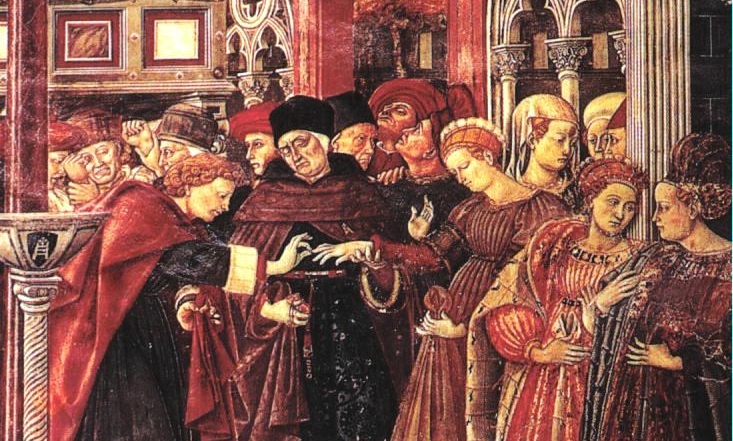I like Saint Valentine. I am also a big fan of Christian marriage, and he was martyred for illegally presiding over Christian marriages. Through some bizarre accident of history, his feast-day is observed by the secular world, but the Church has taken him off the General Calendar. Unfortunately, I think very few people who mark this day on their personal calendars ever consider the life of the saint or the reason he died. This is but a reflection of a deeper problem: just as the world celebrates the feast of the patron of love without actually celebrating the patron himself, so also the world celebrates romantic love without actually thinking much about what love is in the first place.
In his book Love and Responsibility (written before he became Pope), Saint John Paul II impugns the idea that the point of a relationship is for both members to derive pleasure from it. The problem with this idea is that pleasure is not really a goal; there is no pleasure except pleasure in something. We eat cake for pleasure. We do not eat pleasure directly. No cake, no pleasure. Somehow, the world is trying to eat for pleasure without thinking too much about the step where you actually put food in the mouth. Such is a relationship of pure pleasure.
Any relationship, not just marriage, needs to be based on a common goal. For example, hunting buddies have a relationship based on hunting. These sorts of relationships often lead to pleasure, but a relationship that is only founded upon mutual pleasure is actually the most unstable, because pleasure is so ephemeral. This can be said of emotional as well as physical pleasures. The deep feeling of contentment that arises when silently beholding a sunset with a lover is certainly a high pleasure, even the stuff of poetry, but that delight must give way to a chilly night. When night falls, something more than the sunset must remain to keep the relationship together.
Marriage is the most profound of human relationships, and so it must be based on the highest goal. That goal is nothing but the giving of one’s entire self. Saint John Paul II teaches that such giving is perfected only in procreation. It is in the bearing and raising of children that man and woman give themselves so fully that they make more of each other. Only by pursuing together the good of children can the couple really be united, even if the hope for children never comes to fruition. If either withholds this gift, the relationship becomes one of mere pleasure or convenience or some other friendly pursuit.
Children can make life difficult. They demand self-sacrifice, especially when they present particular difficulties. I have a younger brother with special needs and I saw plenty of self-sacrifice from my parents growing up. It is not easy. Sleeplessness is not fun. No engaged couple dreams of interminable appointments with doctors and therapists of various stripes. At the same time, the gift of existence is one of the greatest gifts, despite the price. God, the giver of all existence, allows a man and a woman to share in his goodness by transmitting this most precious gift to their child. They can do this only with and through each other. The giving of this gift is fulfilling, because it is the gift that we were made to give. Giving this gift gives real joy.
This goal of procreation does not replace all the other goods of marriage. Instead, it makes them possible. A marriage can only be more than a house-sharing agreement if it aspires to a higher goal. Sexual union can only be more than an “arrangement” if it aspires to something more than physical pleasure. The joy of self-giving can only be felt in the actual giving of oneself. The work of arranging one’s life around these different goods can, of course, be difficult, but the order of goods that the Church provides allows marriage to be structured firmly and stably. Only then can the desire to love be fulfilled. The passing on of existence is the only sufficient basis for marital love.
✠
Image: Domenico di Bartolo, The Marriage of the Foundlings







